|
Word Gems
exploring self-realization, sacred personhood, and full humanity
Soul & Spirit
"... a dividing asunder of soul and spirit." Hebrews 4:12
“Matter is spirit moving slowly enough to be seen.” Pierre Teilhard de Chardin
Ralph Waldo Emerson: The Over-Soul
Ralph Waldo Emerson: Self-Reliance

I can still see myself in second grade in parochial school, the day Sister attempted to instruct us on the meaning of the soul…

She drew a stick-man on the blackboard but then enhanced the hapless figure with a small oval overlaying the mid-section. The oval, she said, was man's soul.
Well, it's not so easy to offer description of the elusive soul, even a metaphoric one, and hers is not a bad start; but let's investigate further.
Editor's note: As advocate for my teacher of ancient times, let us consider that both Plato and Dr. Campbell have employed the circle to denote the soul - but, with a difference:
|

from the book, “The Power Of Myth,”
a discussion with Dr. Joseph Campbell

Moyers: I remember a lecture in which you drew a circle, and you said, "That's your soul."
Campbell: Well, that was simply a pedagogical stunt. Plato said somewhere that the soul is a circle. I took this idea to suggest on the blackboard the whole sphere of the psyche. Then I drew a horizontal line across the circle to represent the line of separation of the conscious and unconscious. The center from which all our energy comes I represented as a dot in the center of the circle, below the horizontal line… Now, above the horizontal line there is the ego [the thinking mind, the chattering in the head that won't shut down], which I represent as a square: that aspect of our consciousness we identify as our center. But, you see, it’s very much off center. We think this is what’s running the show, but it isn’t.
Moyers: What’s running the show?
Campbell: What’s running the show is what’s coming up from way down below…
|
the battle to define reality
At the time of this writing, I have recently completed a survey of the 500 Leslie Flint tape recordings; 500 testimonies from people on the other side concerning what life is like there. As I’ve discovered, there are so many opinions, even in Summerland, on the meaning of life and how to live it. It’s a “wild west,” a motley congeries, of all manner of philosophy and viewpoint. Just this morning, I thought, “How can I offer summary of such a vast panoply of diverse thought?”
But, then it occurred to me, there is one unifying element in all this mayhem: All egos want something from you. All egos are trying to “sell you something.”
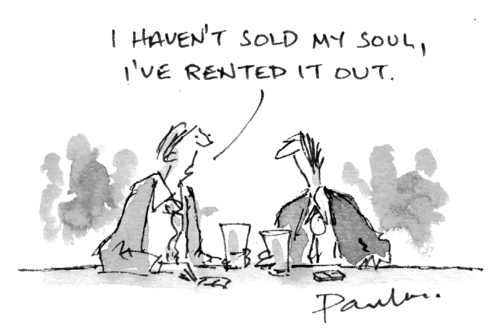
every ego is selling something
|
more than drinking the koolaid
The long reach of cultism encompasses much more than crackpot churches. The root idea of cult offers the sense of "cut." This core concept of "cut" leads us to images of refinement and refashioning and, by extension, development, control, pattern, order, and system.
Cultism as systemization finds a ready home in religion and philosophy which seek to regulate and redistill the patterning and ordering of ideas. However, in a larger sense, the spirit of cultism extends to every facet of society. We find it scheming and sedulously at work in politics, academia, family, corporations, entertainment, science, artistry – anywhere power might be gained by capturing credulous and fear-based minds.
See the “cultism” page for a full discussion.

|
And in all of this doctrinaire “true believer-ism,” each religion or denomination will tend to define “soul” and “spirit” a little differently in order to support a narrow ecclesiastical party-platform. This is why there’s so much confusion attached to the terms “soul” and “spirit” - everybody’s selling something, they all want to define reality, but not to your advantage.
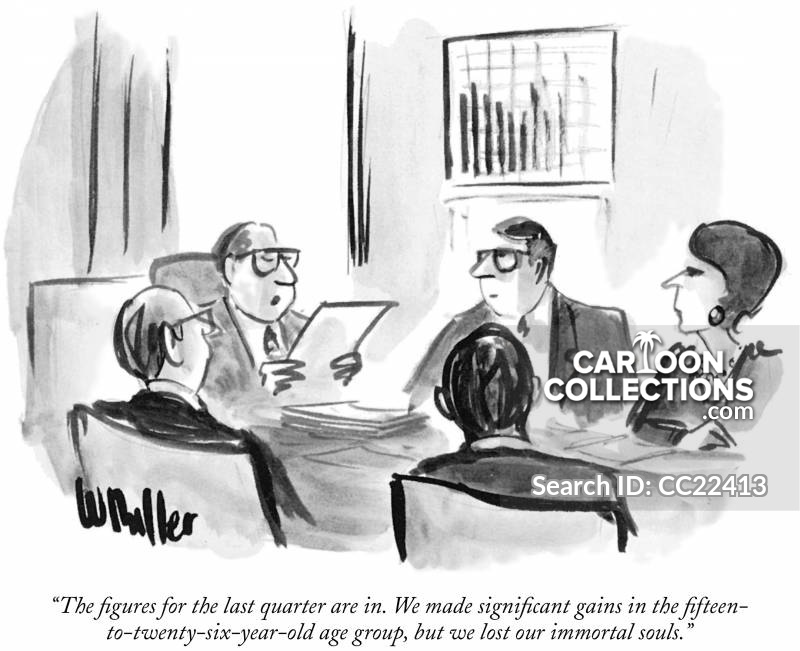
coming to terms
Allow me to offer words and phrases, germane to our discussion, which might begin to clarify this unwieldy issue.
- Andrew Jackson Davis: “When defining spirit I have been compelled to employ the term matter, in the absence of a better word, because it is expressive of substance, and such is spirit.”
- Carlyle Petersilea, channeled “Letters From the Spirit World": “Matter and spirit are merely the clothing for the soul, or the life. Spirit is not life, neither is matter. Life is not, at first, within either.”
only universal consciousness is real, and everything, in this world and the next, is an extension of it
soul: The real you, the deeper person, the “true self”; one’s link to God, to Universal Consciousness (UC). The soul (UC) is the animating life-force, the vivifying principle, that which makes us "alive." The soul is not the thinking mind, per se, not the chattering "voice in the head," but the silent, wordless, background, monitoring "presence," a pure awareness, the part of us that knows and witnesses that we are thinking. As Dr. Campbell put it, "this is what's running the show."
spirit: Sometimes “spirit” is used as synonym of “soul” but should be viewed as underlying “substance,” a rarified form of matter. We will be looking at several examples to make this clear.
An analogy to the three states of matter will help us here. Matter exists as a solid, liquid, or gas; the atomic and molecular makeup in each state remains the same but the space between particles is different. Let’s also recall, as we’ve discussed in other articles, only consciousness, that is, Universal Consciousness, is real. Consciousness is the ground of all being.
We, and all elements of the three-dimensional universe, exist within Consciousness. This means that everything, in this world and the next, lives and exists at the pleasure, and derivation, of Consciousness. It means that matter is an expression of Consciousness; we might think of matter as a form of “frozen” Consciousness, just as a block of ice is frozen water, which might also issue as a liquid or gas at higher temperatures.
Let’s continue with this line of reasoning and posit that “spirit” is akin to matter in that both derive from Consciousness, are forms of "solidified" Consciousness, but spirit is more rarified, the component elements of which are vibrating at a faster rate than the "heavier" matter of our world.
Because of the faster vibration, we cannot see things made of spirit-matter, just as we cannot see the whirling blades of an electric fan.

Editor’s note: It’s put forward, by scientists like Dean Radin, that our senses are calibrated to receive only one-trillionth of the data swirling about us. We are, in effect, totally blind to reality as it is. In after-death communications, however, it is frequently stated “I’ve never been more alive.” Part of the meaning here is that, not only does one feel suffused with a vibrancy of well-being but, one’s capacity to receive sensory input, one's range of consciousness, is greatly expanded.
Lilian Whiting, “The Adventure Beautiful”: “The life entered upon in the ethereal world is as much more real than the present life as manhood is more real than childhood. As life progresses, it grows constantly more significant in its nature.”
|
Restatement
Much of the above definition of soul and spirit was written some years ago, but this entire issue of “coming to terms” seems more simplified for me now.
One of the biggest problems of definition here is that the word “spirit” is often used to mean “soul.” This causes much confusion.
This happens very often in common parlance, but it also occurs in the writings of noted instructors.
Here is an example of the misplacement; ironically, from a teacher who often helps us to clarify:
Andrew Jackson Davis: “As the spirit of man [that is, consciousness as expressed in will-power] acts on his body, so does the Spirit of God [Universal Consciousness as expressed as the divine will] act upon the universe.”
I believe that clarity for us will come by focusing on a major principle: only Universal Consciousness (UC) is real, only God is real, with everything else in the cosmos, including everything in the post-mortem worlds, as derivative of UC.
The soul, one’s consciousness, is part of UC. I think it’s inaccurate to say that the soul is made of UC; rather, the soul is UC, is an extension of UC. At the level of the deeper person, we merge seamlessly with God; as Jesus said, we are one with God.
Matter and spirit are made, so to speak, of UC. Everything is made of UC. Matter - and spirit, too, as it's a form of matter - is a “frozen”, a much slowed-down, form of UC. Father Chardin was correct: “Matter is spirit moving slowly enough to be seen.” The three states of solid, liquid, and gas help us to understand. See much discussion on the “consciousness” page.
Above, I had asserted that the soul is not the thinking mind, the chattering “voice in the head” that will not be quieted. In numerous writings I’ve stated that this phenomenon is to be seen as the “false self,” the part of us that many assume is “the real me,” but only the soul, the background witnessing presence, constitutes one’s truest self.
I think this view needs clarification and is not quite right. The incessant bombardment of the thinking mind, creating mental images, according to the view of Dr. Sheldrake, should be seen as a “quantum field of possibility.” See his comments.
The thinking mind, like everything else, is an extension of UC, but when the thinking mind is linked to a quantum field, then it becomes a kind of creative “movie screen” projecting all manner of possibility. If one is immature, then this quantum field becomes a tool for one’s growing sense of self, part of the individuation process.
But the thinking mind, per se, of course, is not something detrimental, but it can become so during an early stage of immaturity.
And so the mind, yes, is part of UC, but not a purest form of UC, as the mind has been commandeered to serve the ego concerning the individuation process.
The soul is not part of the thinking mind, as such, because the soul, as extension of UC, is the wordless background monitoring presence, which is not engaged in thinking, per se, but is the part of us that knows that we are thinking.
the future of mind-power
From studies of many afterlife testimonies, I believe I’ve gained just the smallest glimpse-and-snatch of the future of mind and thinking. Here’s what I have to go on so far:
Many brain researchers today – see the “consciousness, brain” page -- offer the opinion that the brain, in our current mortal state, serves to filter, reduce, step-down mind-power. It slows us considerably.
When we speak, we do so, of course, word by word by word. And, if we analyze our thinking, not always, but many times, it issues as this kind of word-by-word train of utterance. It’s all very slow, ponderous, and labored. But the mind is capable of much more.
Krishnamurti tells us that, during a mystical experience, we might gain a “total-field” perspective. Not word-by-word but, in a moment, we might grasp a vast array of data – like seeing for miles and miles from a mountain top, as opposed to just the next step ahead.

Some of the afterlife testimonies speak of this expanded mind power. For example, lovers will be able, in a sense, to “download” the memories of each other, thereby mutually totally understanding personal history. This is done in a moment, no word-by-word plodding, but an instantaneous “total-field” receipt of knowledge.
And when people study academic subjects over there, there is no halting over word-by-word transmission of data. Instead, a teacher, in a fllash, is able to “drop into one’s head” a panoramic flowing concept, like a view from that mountain top.
Right now we have but the foggiest notion of how this might work. But coming into perspective is a mind unleashed from the limiting harness of word-by-word.
Today we say, "we are not the thinking mind", and this is true – we, our true selves, are the background witnessing presence that knows we are thinking. But what if this “background witnessing presence” might reconstitute itself one day into a “total-field” perception new-mode of thinking?
If this happens, then the soul would be directly engaged in what might be called “thinking,” but in a radically up-graded manner.
|
Editor's note: The soul itself has no body, nor even a form, as human consciousness derives from Universal Consciousness which is amorphous. On the other hand, the soul, the internal workings of the mind, comes to us not as a blank slate but structured with various innate capacities and sensibilities. Very likely, this internal design is referred to by the phrase “made in the image of God.” Kant in 1781, with his “Critique Of Pure Reason,” became famous for positing the mind as replete with “categories” and “intuitions” which process and formulate sensations, impinging upon us from the outer world. The soul does not possess absolute freedom (which is why reincarnation is not an option); it cannot evolve into something that it was not designed to be. It comes to us in a pre-programmed way, narrowing choices, limiting outcomes, leading us to sacred destiny – which is, finally, an emulation of Mother-Father God.
|
spirit and matter are one and the same, the latter deriving from the former
The following is from Flashes of Light from the Spirit-land, through the mediumship of Mrs. J. H. Conant, by Allen Putnam , Frances Ann Conant, 1872.
Question. You speak of spirit being superior to matter. What is your opinion of the theory that spirit is itself refined or sublimated matter?
Answer. I so believe; but I speak of it in contradistinction to matter [though, truly, it is not], because you have been so educated. You have been educated to divide the two, but, to my own mind, spirit and matter are one and the same, spirit being only a refined degree of matter. Now, you well know that the finer, the more subtle an element is, the more powerful it is. Therefore, if spirit be, as I believe, refined matter, that does not destroy my theory at all, but renders it, if possible, more sure, more perfect. Matter is ever ascending in the scale, and the higher it ascends the more powerful it becomes. It has been said by some that spirit is ever ascending through matter. Very well; call it that, I call it the purer, the subtler part of matter, ever ascending, and the farther it ascends the more it unfolds, the more powerful it is, and the more it can exert great influence over all lower forms.
The following is channeled information via the mediumship of William W. Aber, the Psychic Research Society, as reported in “The Rending Of The Veil” (1898), compiled by J.H. Nixon. Testimonies were offered by numerous spirit-persons by means of full-form visible materialization. Spirit William Denton communicates:
"A spirit may be considered as refined matter" ...
Question: "What is the soul of man?"
"As we understand, mind and soul are the same."
|
the world of spirit: “Spirit” does not mean, has no necessary link to, being “holy” or “religious” or the like. For example, the phrase “the world of spirit” should not, does not, indicate “a place where everyone is holy” or some such platitudinous notion because there are a lot of bad people, even criminal minds, over there; in fact, there’re probably more bad ones in “the world of spirit” than good. The phrase “the world of spirit" stands in contradistinction to the world of gross matter, that is, the Earth-world.
Also see channeled testimony from the other side in which the speaker says that bodies over there are "clothed in ethereal matter", that is, a lighter or more rarified form of matter, which we call "spirit".
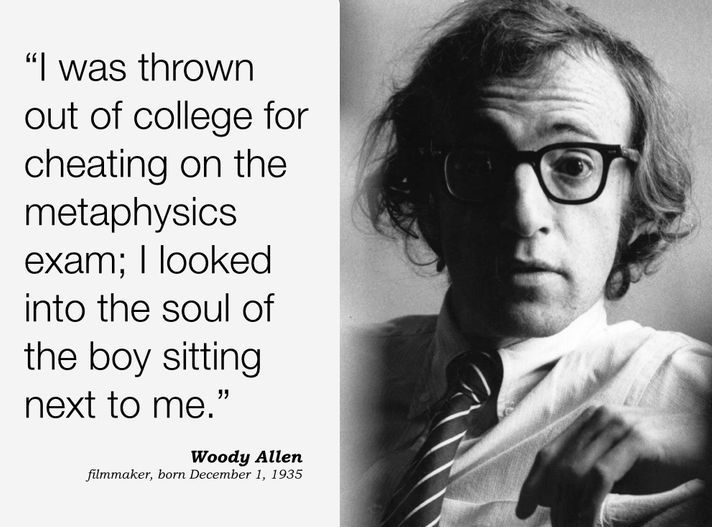
Spirit speaks to us: “Spirit” in this sense might refer to the inner promptings, the “still small voice,” of Universal Consciousness; in other words its a synonym for "soul"; or it could refer to inspiration offered by Spirit Guides.
Spirit Guides: Again, “Spirit” in reference to the Guides does not mean that they are “holy” or better than we (which might be denoted if they were to be called "Spiritual Guides"), but only that they are inhabitants of another world, with bodies inviolable, the substance of which vibrates at a higher rate than earthly matter. The spirit-bodies of the Guides are composed of this higher-grade, more rarified, form of matter -- as solid to them as our bodies are to us -- as such, their outward forms enjoy the benefit of indestructibility.
spirituality, spiritual person: I would direct you to my four articles on the essence of spirituality. But, essentially, the spiritual person is one whose soul, with awareness, is aligned with, is attuned to, the promptings of Universal Consciousness.
growing spiritually: This is another example of the use of "spirit" when "soul" is meant. We hear this phrase a lot. Usually, "growing spiritually" means to suggest a greater emphasis on becoming kinder, more giving, more interested in godly virtues. But these attributes are the natural result of "growing spiritually," not the focus. We "grow spiritually", in a natural, directly resultant way, when one's inner being, the soul, is more closely aligned with UC. How do we do this? - see the "simply notice" writing.
save my soul: Big Religion invented the fake news that you were made in a defective manner. This is not true. Your soul doesn't need saving. It needs to "wake up" to the reality of its perfection, to what it is and what it has. All human beings were "made in the image of God," meaning, the inner riches of human potential constitute a staggering treasure-trove of talent and ability.
sell my soul: Great themes in world literature address this concept. But it's mythology, it can't happen. For one thing, there is no Satan to "buy" the soul. Our personal consciousness is part of Universal Consciousness. In order to "sell our souls" we'd have to sell God as well, and good luck to us with that.
lose my soul: You can lose something that you have, but you cannot lose something that you are. The soul is not something that you have, it's what you are. You are consciousness itself. That's the real you. You are part of God, of Universal Consciousness. Neither the material body nor the thinking mind is the real you.
spiritual music/prayer/works/movie/retreat/book/church-meeting/marriage/etc.: The following comments also apply to the closely related "holy mountain/day/ritual/conclave/water/ground/etc."
What is the problem with "spiritual" or "holy" this-or-that?
Only Universal Consciousness (UC) is real; meaning, only God is real; everything else enjoys but derivative existence.
All of these items -- the music, the ritual, the meeting, the day -- are, at best, mere sign-markers pointing the way to a larger destination and reality.
Nothing wrong with sign-markers, unless people fall in love with the sign-marker, find comfort in the form and shadow, and fail to arrive at the good stuff. A sign-marker won't take you to where you need to go and will leave you empty and unfulfilled.
Only one's soul is "real", in that it is part of God's very essence, is one with God - and not merely deriving from God, from UC, as does spirit/matter.
See the article on "God as singular pervasive reality." Dr. Gerald Schroeder helps us to understand the original Hebrew of "the Eternal is One"; which is, "there is nothing else" - only God is real.
Holy Spirit: The so-called divine trinity with its third member, the Holy Spirit, does not exist. Just more fake news. Like Satan, this entity-as-person was manufactured by Big Religion as a power-and-control concept. The "Holy Spirit" should be rendered "holy spirit," rather, in plain English, "the purified consciousness."
life in the spirit: The apostle Paul used many phrases like this in his Letter to the Galatians, the oldest document in the New Testament. "Life in the spirit" essentially means "living in the Consciousness of God." You'll want to read about this in my extended writing, a complete commentary on Galatians.
body, soul, and spirit: This tripartite division is made by Paul in I Thessalonians. I recall pondering the meaning of these as a young Bible student. Paul probably meant "mind" with the use of "spirit". He draws distinction between mind and body, likely, because many people believe they are either their bodies or the thinking mind - both of these views are errant.
See the above discussion on mind as quantum field. The thinking mind is different from soul.
"Spirit" -- in a more generalized sense of the term -- and "body" represent forms of matter, vibrating at different rates.
"Soul" is one's individualized portion of Universal Consciousness. We might think of it as a "portion" but, in fact, Consciousness is a singularity and cannot be divided, as such; there is only one Consciousness in the universe. All forms of matter, in this world and the next, derive from Universal Consciousness.
God is (a) Spirit: Second only to the writings of Shakespeare, the classic 1611 King James translation of the Bible shepherded the development of the English language more than any other single source. Its influence, however, issued not always as a force for precision and truthfulness. Fifty scholars, teams of translators, each led by personal opinion and prejudice, refashioned New Testament Greek as the King’s English, but with sometimes shocking disparity of result.
For example, in the Gospel of John, the Greek phrase referring to the divine spirit was translated as “Holy Spirit” by one team while another group of translators rendered the same Greek phrase as “Holy Ghost.” Clearly, the process of translation of the Greek manuscripts often became a function more of art than science.
But lack of objectivity and private view become a greater problem when the literal message of the Greek manuscript might contradict established orthodox teaching of the Church of England. We might easily imagine the dilemma for the translators: “What would the King say if we translated the Greek into some heretical idea opposed to what the Church teaches? Good King James has no sense of humor about these things.”
One such conundrum was met in John chapter four, the story of Jesus speaking to the Samaritan woman at the well. I frequently allude to this pericope as it features Jesus’ comments about the “living waters" – archaic English for an "artesian spring." But here's a new aspect. The woman makes reference to a local temple. Let’s listen in on Jesus’ response, brought to us by another famous translation, The Becker Living Version:
And Jesus said: “Your temple is an impressive building for sure, and everyone here is so very proud of it, but let me tell you something: A day is coming when people will no longer be worshipping God in temples made of stone, constructed by human hands. In that day people will worship God in spirit and in truth. This is altogether fitting and the most natural thing you could do because God is Spirit and those who worship him must do so in a spiritual, non-materialistic manner.”
The translators didn’t know what to do with “God is Spirit.” Orthodox teaching anthropomorphized God as a stern grandfather-figure in the sky, a humorless old man with a long white beard sitting on a marble throne, hurling judgment and invective at helpless people just for doing nothing. The translators imagined God as a Spirit-being with a human body, not as amorphous Spirit. Their solution was to insert an article, the letter “a,” before “Spirit,” thereby turning God into a Spirit-man. King James would buy this, but the other was a hard sell in his court. (The letter "a" printed in italics in the KJV indicates that the original Greek does not support this rendering.)
The actual meaning of Jesus’ words, however, is not so hard to discern, especially as we consider the context of the entire conversation with the woman:
“God is not a Spirit, God is not a human-figure in the sky; instead, God is Spirit, that is, God is Consciousness itself, Universal Consciousness. God is all and in all, and all things are made of God’s essence. It makes absolutely no sense and becomes the height of folly to think that you can find God -- the one who in habits eternity, the universe, and all dimensions -- in some little church-building with four walls. What a ridiculous idea! Those who understand what I’m saying will worship God – not in a temple or in a church – but in spirit and in truth; that is, by aligning one’s consciousness (soul essence) with Universal Consciousness, which is a reflection of reality (truth).”
the long dark night of the soul: One of my favorite quotations is from the great writer, F. Scott Fitzgerald: “In the [long] dark night of the soul, it is always three o'clock in the morning.” This says so much. Three A.M. can be a most miserable time, with no place to run and hide, no artifice available to distract. At three A.M., we are most alone, frighteningly so, with ourselves.
But why should the soul experience a “long dark night,” and what does this mean? In the article on “Repression,” as per the findings of the famous psychologists, we learn that people will do almost anything to avoid meeting themselves authentically. As such, they will fill their lives with all manner of self-beguilement and misdirection. Such obfuscation could take the form of too much mall-shopping, drinking, the incessant sexual conquest, of television as background noise and never turned off, or the inveterate crossword-puzzler, or too much emphasis on sports; on and on.
People hide from life, and primarily from themselves, in all of these pastimes, but not infrequently the repression might take the guise of worthwhile, or even noble, activities, which, if founded upon untoward intent, if used to sedate oneself from the real business of life, then even good things might be tainted with pathology; things like serving others and charitable works, of study and intellectual pursuit, of religious endeavor, of pursuing the arts and aesthetics; and much more. All of these essentially good things can become forms of repression, masks that people wear, roles that people play, in order to hide from their primary existential duties in life, that of coming to know their own souls.
Why is it so hard to live authentically, to meet ourselves? We are afraid. Terrified. Yes, "there is a pain so utter" and "we make inward bedlam and will not come out." We’ve stored up a life-time of “bad movies” in the mind which condemn us for this-or-that word or deed. The dysfunctional ego runs our lives and attempts to convince us that we are no good, unworthy. Led by fear and guilt, we have now become ready candidates, we believe, for future judgment from a hostile god. Big Religion, of course, plays on this.

But why should the soul experience a “long dark night”? When we begin the process of enlightenment, of opening our minds and hearts to life, the “true self,” the source of joy, creativity, and peace, becomes invigorated, but the “false self,” now down for the count and fighting for its disingenuous existence, will work all the harder to keep us on the plantation. All of the “bad movies” will now plague us with a vengeance. And this will go on for a good while, and this is why the soul’s “night” is not only “dark” but “long.” The ego won’t give up its dominion so easily.
F. Scott Fitzgerald meant to say that when you begin to open your mind and heart to life, it won’t be a walk in the park on Sunday afternoon. And you’ll have many hours of despair – the proverbial 3 A.M. – in which all might appear rather bleak; and you will fail many times before mastery is won. The dysfunctional ego has been gaining strength over us all of our lives, and we should not expect to diffuse, to neuter, to turn that big ship around, in one day.
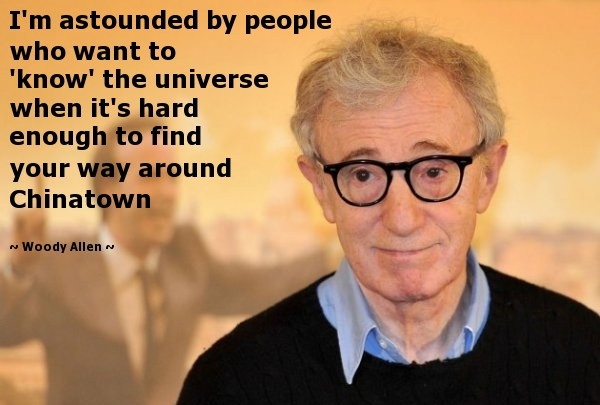
|
Can the eternal soul, the spirit, which do not exist in time, change in the realm of time?

Jiddu Krishnamurti
1895 - 1986
Krishnamurti, May 23, 1955: Can the passage of time change the inward nature, the inward being? Can the soul be reached through the process of time? Is there something eternal in us – the spirit, the soul – which is beyond time? Growth, evolution, change, becoming, all occur in the realm of gradualism, the domain of time, but how can the eternal soul, the spirit, which do not exist in time, change in the realm of time? Is there a part of us which simply is, inviolable, unaffected by the changes of culture, tradition, experience? Surely, God, or truth, or ultimate reality -- the Great Unknowable, the Immensity -- exist beyond the vicissitudes of the petty mundane, beyond the realm of time.
READ MORE
|
|
Is 'God' a personal God, with personality, who knows us individually, or just a life-principle to be found in all aspects of creation?
This is a question that is debated on the other side. Opinions vary. For example, in the books featuring the channeled direct-voice mediumship of Emily French, we find intellectuals over there discussing this issue.
As I look at all the evidence, I must come down on the side favoring a “personal God who knows us” while also acknowledging that “God as a universal life-principle” is also true. This position of complementarity, not contradiction, reminds us of Niels Bohr’s proposition.
In the “evolution” research report we looked at the mathematical evidence strongly indicating that the complexity-harmony we see woven into the fabric of the universe could not have come to us via randomness.
This suggests that a real, living, Intelligence subsumes it all. Each of us has what we call "personality," a sense of personhood, because - to my way of thinking - we reflect the archetypal source of personality and personhood.
While accepting these statements, we also deny that deity is a "sky-God, somewhere 'up there', with long white beard, sitting on a marble throne". Such image represents fodder of ancient myth, the ignorance of primordial peoples, and has no place in reality. God is "spirit," is consciousness itself, is not a "thing" in the 3-D universe. More than this we have difficulty affirming.
This is a large subject, one that we shall be investigating for a very long time to come, even in Summerland. However, here is one testimony from the other side which sees things as I do:
The following is from Flashes of Light from the Spirit-land, through the mediumship of Mrs. J. H. Conant, by Allen Putnam, Frances Ann Conant, 1872.
Question. ls the Deity a being, or is he a principle pervading all Nature? If the latter, why do you address him as a being, in the invocation?
Answer. That our God is a personal, and also an impersonal God, is equally true. Since the God-power or God-life is everywhere, he, it, or she is of course personified everywhere. I believe in the worship of all that is worthy of worship. If it is the flower, let us worship there. If it is the human soul, let us worship there. If it is a lofty thought, let us worship there. Wherever we see anything, or perceive any state, either of mind or matter, that is worthy of worship, there we should worship.
All Spiritualists, I believe, consider God to be an infinite principle pervading all forms, occupying all space. I believe this. I have seen nothing during my life in the spirit-world to cause me to believe otherwise, I did not believe it when here [on Earth].
But the Book of Life hath been so widely opened to me since death, that I can come to no other conclusion than that God is a principle pervading all forms, and occupying all space. God is in the atmosphere, and is the atmosphere. God is in the sunlight, and is the sunlight. God is the sun and the shadow. He is everything, and is in all places. It is absolutely useless to endeavor to confine God to any particular place or state of being, for could we do that, we should rob God of the God-power. We should at once chain this great eternal principle, this infinite life, to finite space [thus limiting God]. We should [by this confinement of God] at once bring it down within the scope of [limited] human analysis.
And I, for one, am glad we cannot. But we have been so in the habit of addressing this Deity, this Power of Life, as though it were a [mere] man or woman, a [mere human] personality like ourselves, that it is very hard to change our course ... as I before remarked, our God is a personal God, and therefore it is proper that we should thus address him.
Editor’s note: In my opinion, some of the best discussion and reasoning concerning what God is will be found in the books of Dr. Federico Faggin.
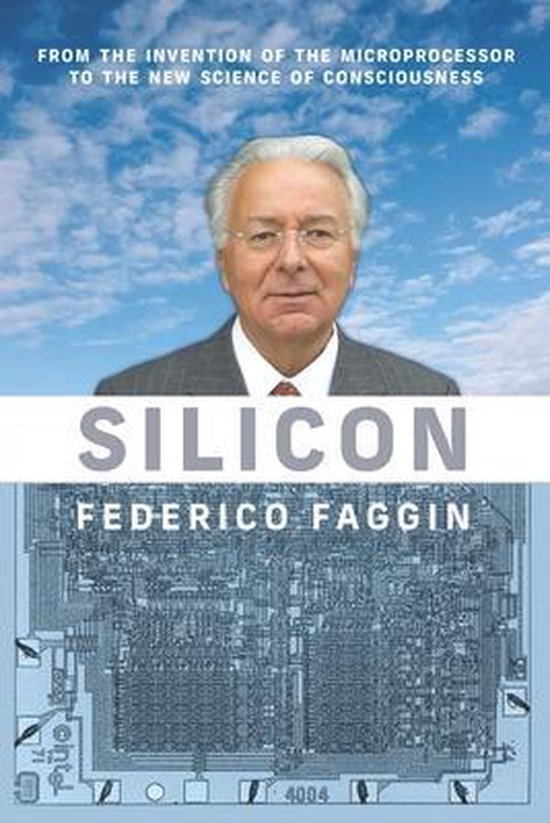
God is Universal Consciousness, which provides the underlying essence of matter, of all things in the universe. (See the "quantum" page.) However, I do not see how we can avoid speaking of God as a “personal God.”
The mathematics of probability strongly lead us to Intelligent Design. (See the "evolution" page.) Can there be such a thing as an Intelligent Designer if said entity is not also, in some sense, an Intelligent Person? How could there be intelligence without an intelligent person?
We speak of God’s love. Despite what skeptics view as a heartless and cold universe, there is a mountain of evidence to suggest that the universe was also created for our pleasure, education, developmental needs, and the like. All these are properly viewed as expressions of love. Can there be such a thing as a God of Love if said entity is not also, in some sense, a Loving Person? How could there be love without a loving person?
We might apply this reasoning to a number of attributes we ascribe to God, and when we do, I would say, it is unavoidable not to also judge said entity as a thinking, rational, feeling Person.
|
|
to be a 'spiritual' person is to align one's heart, soul, and spirit with the Source of Spirit
How do we do this? - see the "simply notice" writing.
|
Eckhart Tolle:
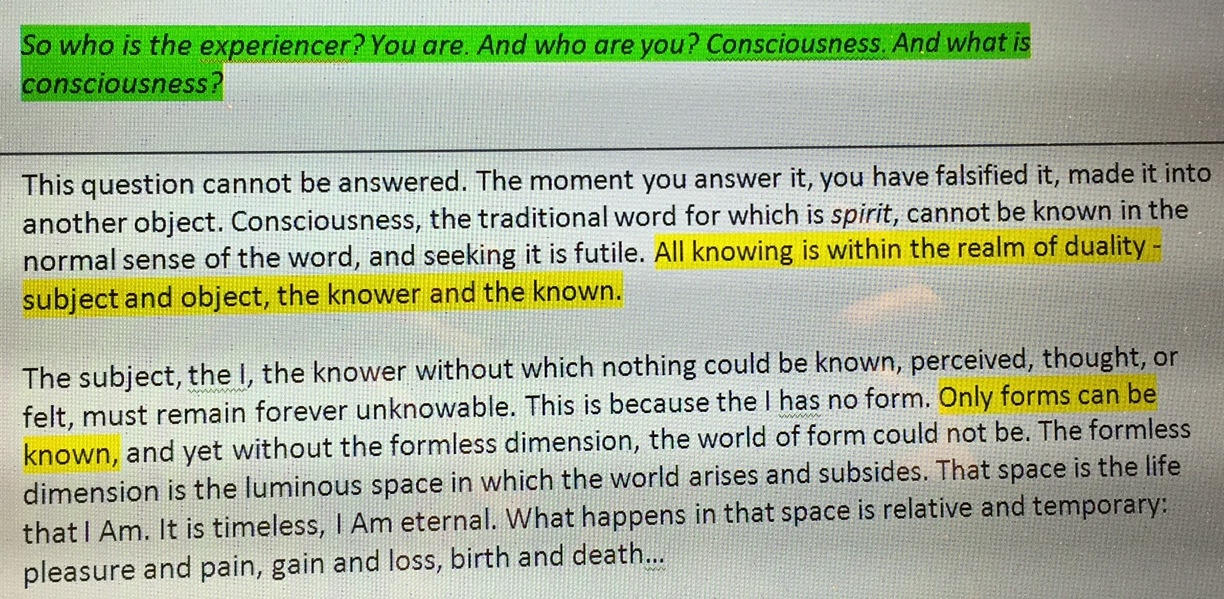
|
Julia on the other side states that losing one's soul is the same as losing one's true self
The following is channeled information from the other side via the mediumship of William T. Stead (automatic writing), reported in the book After Death, or Letters From Julia (1905).
William T. Stead (1849-1912) was one of the greatest crusading journalists of the late 19th century, and also one of the most vocal supporters of Spiritualism. He promoted spirit photography, championed the causes of various mediums, and established the "Julia Bureau" for communications between the bereaved and their loved ones. Stead published a series of hugely influential campaigns whilst editor of The Pall Mall Gazette, and he is best known for his 1885 series of articles, The Maiden Tribute of Modern Babylon. He died on the 1912 ill-fated voyage of the Titanic; after which he communicated via various mediums his experiences in the afterlife.
Editor’s note: The communicating spirit Julia (below) employs the term “soul” to mean, in her own words, the “real self,” or, as we have denoted in these writings, the “true self.”
The Importance of the Soul: It's the Real, the True Self
What seems to me quite clear is that the indifference to the Soul is caused by not understanding that the Soul is the Real Self, the only part of you which lasts, the Divine in you, which you are sacrificing to the things of the day.
What you do not understand is that it is through the Soul alone that you can commune with the Spiritual World that is all around you. And the Spiritual World includes all the world excepting the perishing things of time. When we say Spiritual World [where your loved ones are] all these are lost to you when you lose your Soul. For the Soul alone communicates with the Real World.
It is through the Soul you obtain inspiration. The Soul links you with the Universe of God, with the Soul of the World. And when you lose touch with your Soul you become a mere prisoner in the dungeon of matter, through which you peer a little way by the windows of the senses.
Its Divine Powers
For what I say is that the Soul has Divine powers, but if you will but find your Soul, and develop its Divine potency, there is opened before you a new heaven and a new earth, in which Absence [from loved ones] is not [real], nor Death, and where the whole Universe of Love is yours. Yes, I maintain that what you call miracles are the natural capacities of the Soul. Miracles of Healing, Miracles of Movement, Miracles of Power, which you little dream of, are within the scope of the Soul.
'you are as caterpillars to what you might be'
All that you have read of about the power of Spirit over Matter is nothing to the reality. You are as caterpillars to what you might be.
But the doorway into the Infinite is the Soul, and the Soul is lost. When you have no time to think, no time to pray, you have no time to live…
The Cause of Misery
For the whole of the evils that afflict society arise from the lack of seeing things from the standpoint of the Soul. If you lived for the Soul, cared for what made the Soul a more living reality, and less for the meat and drink and paraphernalia of the body, the whole world would be transfigured; you have got a wrong standpoint and everything is out of focus…
It is possible to lose your Soul in church as well as [in the affairs of the world]. If you have no leisure to be alone with your Soul — it does not so much matter whether the rush and whirl and preoccupation is ecclesiastical or financial — the Soul is lost, and there is nothing to do but to find it again.
Make the Soul the Center
You may sum up what I have to say in one or two words. What I wish you to do is to make the Soul the center, and make time to use the Soul, which alone can do all things. Make Time to save Eternity, nay, to possess it now and to know God [now]. JULIA.
Editor's note: See much discussion on "finding the soul," the "true self," on the "afterlife item #26" page.
|

|
The Dazzling Darkness is a concept representing a frame of mind untrammeled by the dysfunctional ego. Therein, freed from base-alloy lower-nature inclinations, one might apprehend not only the identity of one’s true mate but also a realization of the living presence of God in one’s life. READ MORE
|
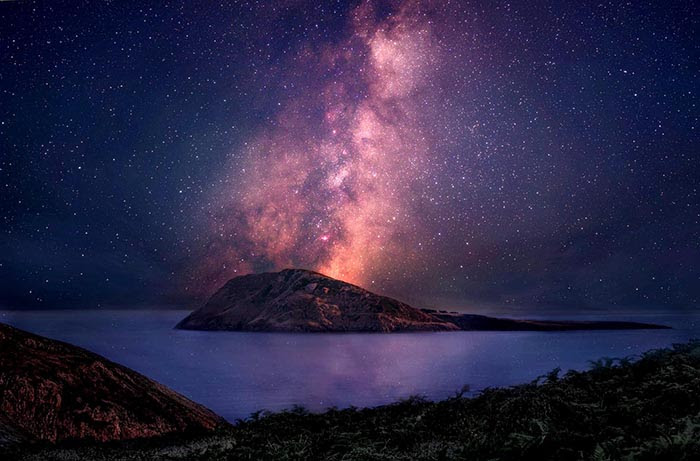
|
Editor's last word:
Somewhere in the afterlife testimonies, a Spirit Guide stated that we, right now, are as much of a spiritual person as ever we shall be.
Each of us, right now, has as much opportunity to access the mind of God, Universal Consciousness, as any person living in Summerland, even ones who are thousands of years old.
Our bodies will change when we cross over; then, we’ll be spirit-beings, but we can be spiritual beings this very moment.
Only an accessing of the life within, Universal Consciousness, will advance us; and even young people can begin to do this. In the kingdom of God, there are no elites, no favorites, no gurus, no "holier than thou," no celebrities, no saints, no "red phone" to highest divinity. You, right now, have as much access to the heights of Mount Olympus as anyone who has ever lived.
|
|














